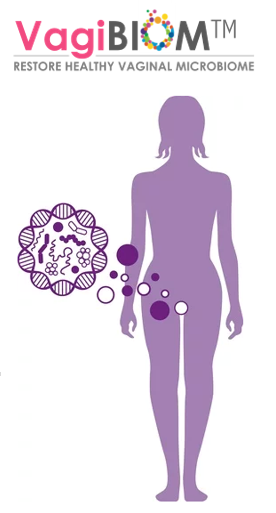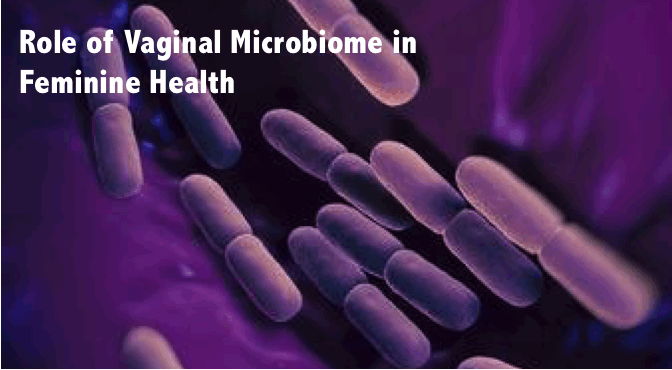Are You Taking Care of Your Healthy Vaginal Microbiome? If not, You Should!
The vaginal microbiome is comprised of a plethora of commensal bacterial species with the most abundant representation by Lactobacillus species.A well-balanced microbiome in the vaginal region is key in preventing infections of the genital tract; however, recent evidence shows it may even influence the development of malignant changes in the cervix and other constituents of the genital tract.
 Very recent study has shown that imbalanced and reduced levels healthy vaginal commensal bacteria may increase a woman’s chance of ovarian cancer. The research team, led at University College London, hope the finding could be used to identify women at high risk of the cancer, which has no screening test.
Very recent study has shown that imbalanced and reduced levels healthy vaginal commensal bacteria may increase a woman’s chance of ovarian cancer. The research team, led at University College London, hope the finding could be used to identify women at high risk of the cancer, which has no screening test.
The American Cancer Society estimates for ovarian cancer in the United States for 2019 are; about 22,530 women will receive a new diagnosis of ovarian cancer and 13,980 women will die from ovarian cancer. Early diagnosis significantly improves the chances of successful treatment, but the symptoms – bloating and discomfort – can be mistaken for more common, less serious conditions, such as menstrual cramps or irritable bowel syndrome. Many women are not diagnosed until the cancer has already started to spread.
There is growing scientific evidence that the community of bacteria and other microbes that reside inside us – our microbiome – influence our wellbeing and health. Lactobacillus and other healthy commensal flora One species of beneficial bacteria inflammation-causing bad microbes from taking up residence and causing harm. The study involved 176 women with ovarian cancer, 109 with inherited high-risk genes for ovarian cancer (BRCA1 genes) and 295 women with no known genetic risk. The women were examined and samples taken using the same collection method used in cervical screening. Lactobacilli levels were significantly lower in the women under 50 with ovarian cancer or high-risk cancer genes.
The link between the vaginal microbiome and gynecological malignancies is a developing and exciting field of research, as several studies that were published recently suggested that such relationship might exist. The overall hypothesis is that vaginal bacteria play an important role in the tumor microenvironment. So, how does your normal vaginal flora – which comprised of Lactobacillus crispatus, Lactobacillus gasseri, Lactobacillus iners, Lactobacillus jenseii- changes? This healthy microflora is key for various key functions in vaginal tissues.
- Commensal flora acts as a first line of attack against pathogenic flora by producing natural antimicrobials such as hydrogen peroxide, lactic acid, and peptides.
- Helps to promote healthy vaginal tissue barrier function, so that no toxin can leak into the blood
- Helps to maintain a optimum acidic vaginal pH
- Boost body’s vaginal immune system
- Breaks natural compounds to produce natural moisturizing compounds to maintain a moist and soothing vaginal tissue.
However, physiologically several things can go wrong and can cause severe disruption to your healthy vaginal flora.
The most common causes of vaginal microbiota dysbiosis are:
- Oral or IV antibiotic use
- Spermicide use
- Excessive vaginal cleaning and douching
- Hormonal changes post-menopause
- Increased frequency of intercourse
- Smoking
- Certain medication use
- Excessive use of synthetic lubricants
- Use of diaphragm
- Stress
Minimizing these “risk factors” then seems to be a good preventative measure, as well as considering the use of a probiotic. BUT – they must have the ability to:
- Adhere and colonize to vaginal cells
- Inhibit pathogen growth and/or attachment.
- Produce lactic acid and hydrogen peroxide
- Naturally moisturize vaginal tissues
While oral probiotics for gut health is a sprawling market, there is scant of products for vaginal microbiome health. That is the reason; we at Biom Pharmaceutical have dedicated resources and microbiome expertise for this feminine health sector. Our team of researchers, physicians and product development team are focused on vaginal microbiome-based technologies and products.
Our patented microbiome BiomsifyTM fermentation technology allows vaginal tissue –adapted commensal flora to maximally adhere and colonize the vaginal tissue. Our proprietary strains of Lactobacillus crispatus Bi16 and Lactobacillus gasseri Bi19 are from healthy human commensal flora that inhibit pathogens with high colonization capacity and metabolize mucopolysaccharides to naturally moisturize vaginal tissues. We have developed a line of probiotic suppositories and vaginal moisturizers under the VagiBiomTM brand to enhance the health and longevity of women by restoring and replenishing their healthy vaginal microbiome.




